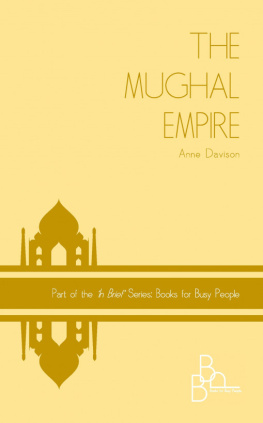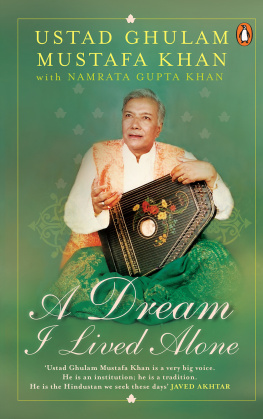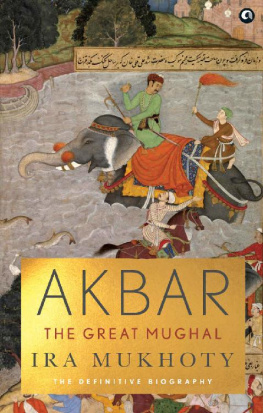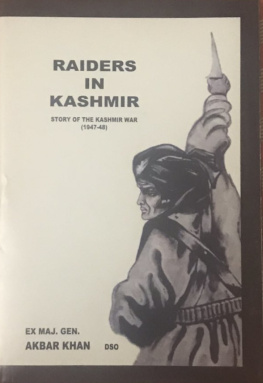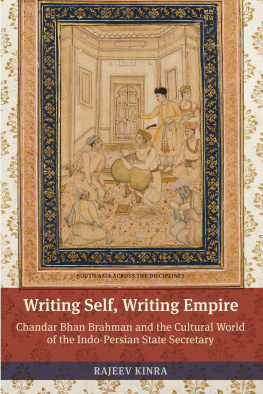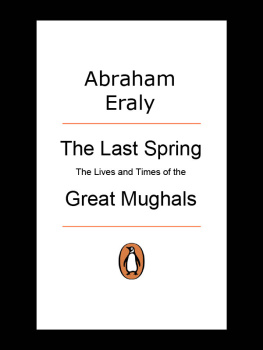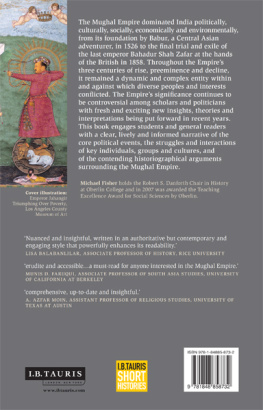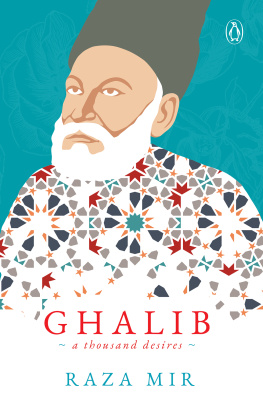Table of Contents
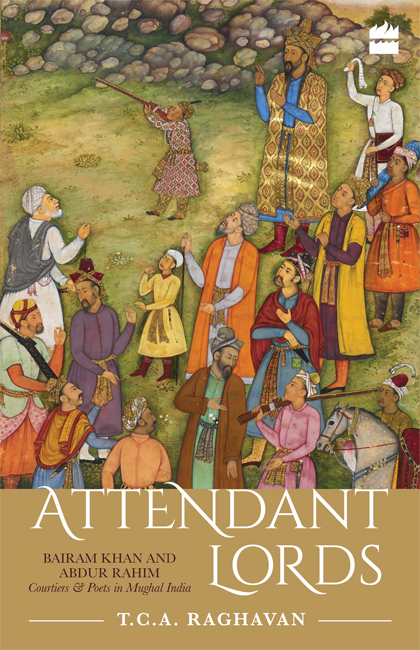
ATTENDANT LORDS
BAIRAM KHAN AND ABDUR RAHIM
COURTIERS & POETS IN MUGHAL INDIA
T.C.A. RAGHAVAN

To the memory of my parents
T.C.A. Srinivasa Varadan
T.C.A. Nayantara
No! I am not Prince Hamlet, nor was meant to be;
Am an attendant lord, one that will do
To swell a progress, start a scene or two,
Advise the prince
T. S. Eliot, The Love Song of J. Alfred Prufock
CONTENTS
T HIS BOOK is about the lives of two noblemen in Mughal India: Bairam Khan Khan-i-Khanan (c. 14971561) and his son Abdur Rahim Khan-i-Khanan (15561626). In any period and in any country, these would have been extraordinary men. Bairam was a Persian Turkmen, scion of a distinguished clan that was influential in Persia and Central Asia in the fifteenth century. He stands out in Mughal history as the regent of the empire for five years after the premature death of Emperor Humayun, when Akbar was still a child and too young to rule. Bairams son, Abdur Rahim, became one of the great generals of the Mughal empire and a premier noble during the reigns of Akbar and Jahangir. Abdur Rahims political and military achievements surpass his fathers, but he is best remembered for his literary prowess. He was one of the great patrons of Persian literature of his time; in the history of Hindi literature, he has an even greater reputation as an outstanding poet in a century of literary achievement. Between them, the father and son straddled some hundred years of Mughal history in India, living through the reigns of four emperors, and their spectacular and turbulent trajectories reflect both the grand designs and the destructive courtly intrigues of Mughal politics.
In the sixteenth and early seventeenth centuries Bairam Khan and Abdur Rahim stood at the confluence of the faiths of Islam and Hinduism. It was a defining time elsewhere too. In Europe, ProtestantCatholic conflicts were raging; Luther and Calvin were advocating an open defiance of centuries of established Roman Catholic doctrine. In England the great Tudors, Henry VIII and Elizabeth I, were laying the foundations of future English maritime and commercial dominance. Kepler, Copernicus, Galileo and Shakespeare were reshaping ideas of science and literature. In northern India too this was the age of a great literary and spiritual effervescence as under the Mughals, India once again entered the age of a centralized empire. With the poet saints Tulsidas and Surdas, a spiritual community of devotion to the Hindu gods, Rama and Krishna, was consolidated and simultaneously Braj Bhasha and Avadhi were transformed from the status of dialects to the maturity of full-fledged languages. If the devotional verses of these poets catalysed this transformation, secular largely courtly and sensuous poetry such as of the great Keshavdas played an equally significant role in the literary revolution in north India in the sixteenth century. Literature plays some part in our story too, for both Bairam Khan and Abdur Rahim regarded literary achievement as a means to political status as well as a vital adjunct in its consolidation.
An account of these two lives, substantial and extraordinary though they undoubtedly were, would nevertheless be incomplete if we stopped with their life stories. The shadows of Bairam Khan and Abdur Rahim touch our times as well: these real-life medieval figures have been transformed into templates; their lives celebrated in numerous ways through association with significant milestones or other icons from history. In these narratives, literary enterprise, history, language and religion are inextricably combined within a broader context of nationalism and nation building, as answers to the dilemmas of the present are sought in the perceived certainties of the past.
Above all, this is a story of life and politics in Mughal India. Bairam Khan and Abdur Rahim Khan-i-Khanan were powerful men at the heart of the Mughal court. Their great military feats, political acumen and their closeness to successive emperors brought them great rewards and enviable positions, yet they were prey to all the jealousies and betrayals, ideological and religious contests and controversies that the acquisition of power and the loss of it inevitably brings, no matter in which century or country. Their personal tragedies still resonate each time an act of miscalculation, or misjudgement, or the outmanoeuvring by a rival, or the simple arbitrariness of power takes its toll.
A S DUSK fell on the last day of January 1561, an ageing nobleman was boating in the Sahasralinga Talav, on the outskirts of Patan. His bearing was distinguished; even in a boat, his air of authority was apparent. Yet, the entourage waiting on the bank of the lake was quite small. He had spent some time sitting in the small pavilion at the centre of the lake, but now he was being rowed back to the bank.
As his boat approached, a group of men Afghans by their appearance came forward to pay their respects. The noble obviously found this unsurprising and directed the boatman towards them, some fifty yards away. The man at the head of the Afghan group greeted the nobleman courteously as he alighted from the boat. As they embraced, the Afghan unsheathed a dagger and planted it in the noblemans back with such force that it pierced right through, emerging from the breast. Another Afghan struck with a sword to the head. Death came instantaneously, but one source describes the nobleman, blood gushing from his wounds, reciting the words of the Shahadat as he lay dying: there is no God except Allah and Muhammad is his Prophet.
The life of Bairam Khan, Emperor Humayuns most trusted general and Emperor Akbars regent, ended that evening on the banks of the Sahasralinga Talav in Patan, Gujarat. A Turkmen by birth, his eminent position during the last decade of Humayuns life and in the early years of Akbars reign is recorded frequently in the miniatures painted to illustrate contemporary milestones. The most dramatic is, naturally, a representation of the assassination. We see the Afghans outnumbering Bairam Khans small entourage; his followers fleeing in disarray; his camp, some distance away, attacked and plundered; his body unguarded and untended by the lakeside (see Plate I).

Bairam Khans tumultuous life and tragic end constitute one of the most dramatic narratives of the Mughal era. He was the faithful friend and counsellor of the second emperor, Humayun, and was guardian to the third, Akbar, after Humayuns premature death in 1556. As regent, he was responsible for the consolidation of the empire after the second battle of Panipat. Bairams fall from favour and his tragic end in Patan on the shores of the Sahasralinga Talav were in some ways a fitting end to his life, the tragedy and pathos of the concluding drama giving a certain completeness to the story.
If the milestones of Bairams life are well known, the details of the journey are less so. It is with Bairams patrimony, therefore, that we begin this story; indeed, his foremost modern biographer begins by saying: Bairam Khan was no novus homo: he had a great ancestry. This background remained a determining factor throughout his life; his rise to greatness was, to his contemporaries and biographers alike, a consequence of his patrimony. He belonged to the Baharlu clan of the major tribal confederation of the Qara Qoyunlu, which reached its greatest power and spread stretching over parts of present-day Iraq, Afghanistan, Persia and Azerbaijan in the mid-fifteenth century during the reign of Mirza Jahan Shah (143767). The great rivals of the Qara Qoyunlu were the Aq Qoyunlu; their conflicts and contests dominated a large part of the fifteenth century in that region. A sectarian edge provided an added dimension to this rivalry: the Aq Qoyunlu were Sunni, the Qara Qoyunlu were Shia. The Aq Qoyunlu fared better in the great rivalry and after Jahan Shah, the Qara Qoyunlu were never in a position to assert control over a large dominion of their own.


